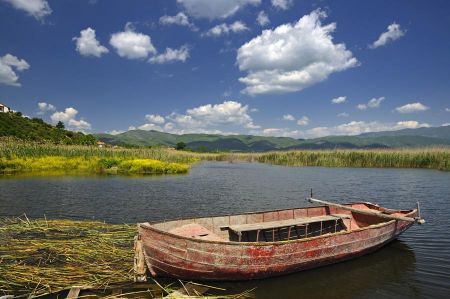A detour with consequences - Passage of the Lake Dojran
- Written by Portal Editor
Our return journey from the CMT fair in Stuttgart was overshadowed by a very special event, as Greek farmers protested against the austerity policy of the government of Alexis Tsipras.
Not new to this year, when there is no work on the fields, we first got commented on our request for a bypass, because the border crossing between Macedonia and Greece near Evzoni was completely closed with tractors. And it has been closed for around 15 days already. The Tsipras government had substantially increased farmers' taxation and pension contributions and abolished the reduced diesel price for farmers. The peasants demand that these reforms will be withdrawn.
Detour to the small border crossing at Lake Dojran
On both sides of the important border crossing, long truck jams had already formed, waiting for their check-in. Friendly border officials, who handled us and also let us pass (the attempt of passing through was always worth it), had pointed out the complete blocking and then on the way back detour via Bogdanci to the border crossing at Dojran, a small border crossing on Dojran Lake. So we drove the R 1109 road to the junction to Dojran where we turned to the R 1105 to the border crossing, which was really crowded and narrow. The view on the lake and into the mountains in the background, on the other hand, was quite impressive. Unfortunately, the dawning twilight prevented further photos, so we immediately decided to come back in the spring.
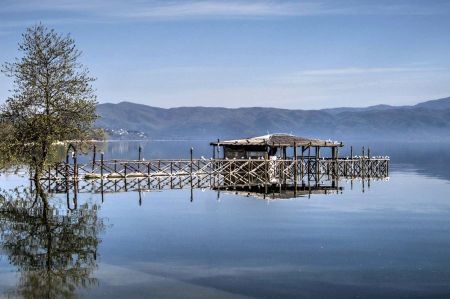 Lake Dojran is the smallest of the three great lakes in the Balkan region of Macedonia after Lake Ohrid and Lake Prespa, which is also a center of a significant nature reserve. The lake is one of the oldest and most natural lakes in Europe. The Dojran Lake and its surroundings are becoming increasingly popular among travelers with an active background such as hiking, cycling or mountain biking. For a while the local tourists turned their backs on the warm lake. However, it has recently found more interest by the tourists. The Dojran Lake is located in the southeast of Macedonia on the border with Greece, which also runs through the lake. Of its area of 43.1 km², 22 km² belong to Greece. The lake is at an altitude of 147 m above sea level and is only about 10 m deep on average. The growing natural genes are used to treat rheumatism, bone pain, asthma, bronchitis and other diseases.
Lake Dojran is the smallest of the three great lakes in the Balkan region of Macedonia after Lake Ohrid and Lake Prespa, which is also a center of a significant nature reserve. The lake is one of the oldest and most natural lakes in Europe. The Dojran Lake and its surroundings are becoming increasingly popular among travelers with an active background such as hiking, cycling or mountain biking. For a while the local tourists turned their backs on the warm lake. However, it has recently found more interest by the tourists. The Dojran Lake is located in the southeast of Macedonia on the border with Greece, which also runs through the lake. Of its area of 43.1 km², 22 km² belong to Greece. The lake is at an altitude of 147 m above sea level and is only about 10 m deep on average. The growing natural genes are used to treat rheumatism, bone pain, asthma, bronchitis and other diseases.
Lake Dojran is located in southeastern Macedonia
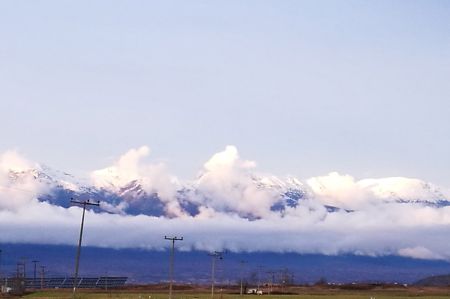 During the First World War, the front line of so called Salonikifront between the troops of Germany, Austria-Hungary and Bulgaria on the side of the Central Powers as well as the troops of the Entente Powers France, Great Britain and later Greece was here. The most important of the battles was the 3rd Dojran Battle on 18 and 19 of September 1918, in which Greek and British troops broke through the strongly fortified front of the Bulgarians on the eastern edge of the lake. A cemetery of the Commonwealth War Graves Commission and a memorial to Great Britain and Greece forces is placed here too.
During the First World War, the front line of so called Salonikifront between the troops of Germany, Austria-Hungary and Bulgaria on the side of the Central Powers as well as the troops of the Entente Powers France, Great Britain and later Greece was here. The most important of the battles was the 3rd Dojran Battle on 18 and 19 of September 1918, in which Greek and British troops broke through the strongly fortified front of the Bulgarians on the eastern edge of the lake. A cemetery of the Commonwealth War Graves Commission and a memorial to Great Britain and Greece forces is placed here too.
In 2002 a project was started in Macedonia on the construction of an aqueduct which will supply the lake, whose water level has fallen by almost five meters during the past 20 years, mainly due to excessive water abstraction for agriculture, with water from the surrounding mountains. In return, Greece has undertaken to take measures to protect the lake, which is still considered as ecologically valuable.
After crossing the border, which took a long time due to the high traffic volume, we quickly made our way to the Thessalonica, where Toni and Alexander Zampetas were already waiting for us at the camper stop of the same name.
A Detour with Positive Consequences – The Passage of Lake Dojran
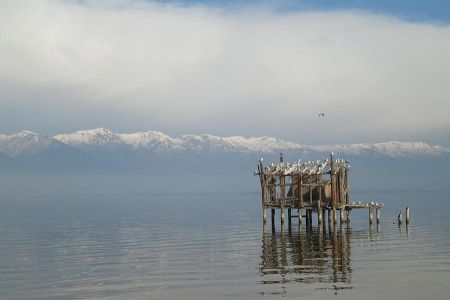 Sometimes life takes us down unexpected paths – but often it's precisely these detours that yield the most beautiful discoveries. This can also be the case with a visit to Lake Dojran. This tranquil, natural paradise in southern North Macedonia offers not only impressive landscapes, but also a fascinating history and diverse recreational opportunities. But what makes this place so special? Let's embark on a journey together and discover why the Passage of Lake Dojran is worth a visit.
Sometimes life takes us down unexpected paths – but often it's precisely these detours that yield the most beautiful discoveries. This can also be the case with a visit to Lake Dojran. This tranquil, natural paradise in southern North Macedonia offers not only impressive landscapes, but also a fascinating history and diverse recreational opportunities. But what makes this place so special? Let's embark on a journey together and discover why the Passage of Lake Dojran is worth a visit.
By the way: The city of Dojran became famous in the 5th century thanks to the Greek historian Herodotus. He wrote stories about the ancient Thraco-Illyrian people who established the first human settlement in the area. Herodotus noted that the first population group settled via Lake Dojran.
Lake Dojran – A Hidden Gem in the Balkans
Geographical Location and Significance
Lake Dojran lies on the border between North Macedonia and Greece. With an area of approximately 43.1 km², it is one of the smaller lakes in the Balkans, yet it is a significant ecosystem. Its maximum depth is only about 10 meters, which means the water warms up particularly quickly – an ideal destination for beach vacationers.
Nature and Biodiversity
Despite its relatively small size, Lake Dojran is home to an impressive biodiversity. Numerous fish species, including carp and catfish, as well as rare bird species such as the Dalmatian pelican, live here. The surrounding wetlands also provide habitat for a variety of plants and animals.
Historical Significance of Lake Dojran
Historical Events and Cultural Influences
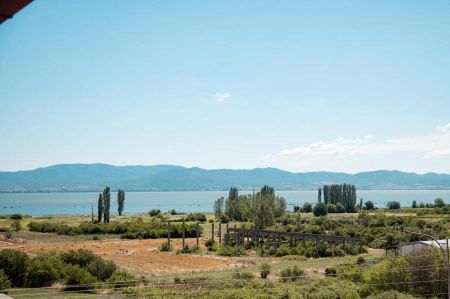 The lake has been an important habitat for fishermen and traders for centuries. The nearby town of Dojran, which gave the lake its name, was an important trading center.
The lake has been an important habitat for fishermen and traders for centuries. The nearby town of Dojran, which gave the lake its name, was an important trading center.
The Lake's Role in World War I
During World War I, the region was the scene of fierce fighting between the Allies and the Bulgarian army. Even today, there are numerous monuments and memorials that commemorate the lake's past.
A Detour with Positive Consequences – Why It's Worth a Visit
Unique Landscapes and Natural Beauty
The landscape around Lake Dojran is breathtaking: rolling hills, crystal-clear water, and a tranquil atmosphere make this place a perfect retreat.
Rest and Relaxation Away from the Tourist Crowds
Unlike Lake Ohrid or Lake Prespa, Lake Dojran is less crowded. Here, you can enjoy nature in peace and unwind.
Activities Around Lake Dojran
Hiking and Nature Exploration
There are numerous hiking trails in the area that lead through beautiful natural landscapes. The region is especially ideal for hikers in spring and autumn.
Water Sports and Leisure Activities
Lake Dojran is ideal for swimming, fishing, and boating. Kayaking is also very popular here.
The healing effects of mud baths
A special highlight is the famous mud bath on the shores of the lake. The mineral-rich mud is said to have beneficial effects on skin and joints.
Culinary experiences in the region
Fresh fish specialties from the lake
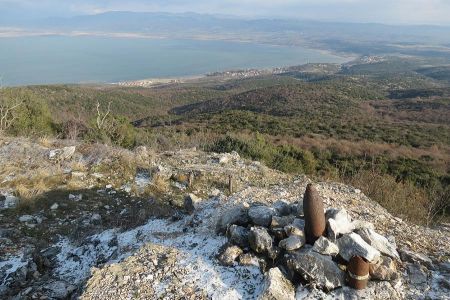 In local restaurants, you can enjoy fresh fish from Lake Dojran, often prepared with regional herbs.
In local restaurants, you can enjoy fresh fish from Lake Dojran, often prepared with regional herbs.
Traditional Macedonian dishes
In addition to fish, there are also savory specialties such as tavče gravče (bean stew) and ajvar, a spicy paprika paste.
Best time to visit and tips for visitors
When is the best time to visit?
The best time to visit is between May and September, when temperatures are pleasantly warm and the water is inviting for swimming.
Important travel tips for an unforgettable stay
• Book early if you want to stay in one of the few accommodations on the lake.
• Don't forget insect repellent – there are many mosquitoes, especially in the summer months.
• Be sure to try the local specialties!
Conclusion
Lake Dojran is a hidden paradise in the Balkans that holds many surprises. Whether you're looking for a natural experience, historical insights, or culinary delights – a detour is definitely worth it. So, why not take a little detour and enjoy the positive consequences?
Frequently Asked Questions (FAQs)
1. What is the best way to reach Lake Dojran?
The easiest way is by car via Skopje or Thessaloniki.
2. Are there hotels or accommodations near the lake?
Yes, there are several small hotels and guesthouses right on the shore.
3. Is Lake Dojran suitable for families with children?
Yes, the shallow water makes it a safe swimming destination for families.
4. What are the attractions in the area?
Besides the lake, the ruins of the old town of Dojran and the monuments from the First World War are worth seeing.
5. Is it possible to camp at Lake Dojran?
Yes, there are several campsites in the area that offer beautiful views of the lake.
Please follow the link:
41° 12′ 17″ N, 22° 44′ 51″ O 41.172502, 22.741414
Please read as well:
